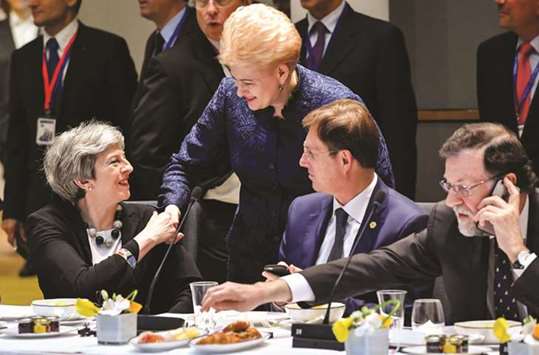Prime Minister Theresa May yesterday welcomed the approval by European Union leaders of a transition period to help business adapt after Brexit, telling the bloc to ride the “new dynamic” in upcoming trade talks.
Endorsing their negotiating stance for trade talks due to start next month, the 27 other EU leaders at a Brussels summit confirmed a political, if not yet legal, commitment to let Britain effectively stay in the bloc — without a vote — until the end of 2020, or 21 months after formal Brexit next March.
But the text carried a warning that “nothing is agreed until everything is agreed” — a threat to May to avoid “backsliding” on a deal to let Northern Ireland remain regulated by Brussels if no better way is found to prevent a “hard border” that could risk the peace.
May said the deal so far “gives certainty to people and businesses. It gives them the clarity to plan for their future.”
“I believe there is a new dynamic now in the negotiations,” she told reporters. “We will now be sitting down and determining those workable solutions for Northern Ireland but also for our future security partnership and economic partnership.”
French President Emmanuel Macron reiterated the EU’s mantra that London would not be allowed to “cherry-pick” access to parts of the EU market: “The single market cannot be divided up. There is not a choice of which sectors you sign up to.
“Once you are outside the single market, you’re outside of it entirely,” Macron said as he shared a podium with German Chancellor Angela Merkel to underline the unity of the bloc’s founders and major powerbrokers.
While grappling with Britain’s departure from the EU, other leaders’ rallied behind May in her standoff with Russia over the Salisbury attack while she added her voice to EU demands on the US that it exempt the bloc from new steel tariffs.
May said the issue mattered for British steelworkers. There was a reminder of difficulties on trade that Britain might face after Brexit when non-EU member Norway found itself excluded from the temporary exemption Trump granted to the bloc.
The transition win for May comes at the expense of having agreed to a “backstop” solution on the Irish border that, if implemented, could infuriate many of her political allies as it could effectively isolate the Northern Ireland economy from mainland Britain by keeping its regulations in line with the EU.
Both sides say they do not want to go back to border checks between the Republic of Ireland and Northern Ireland — as was the case during decades of violence in the British province.
Irish Prime Minister Leo Varadkar highlighted the EU stance that the transition would only become final as part of a broader deal between the bloc and London, which means they have to settle on all outstanding issues — including the Irish border — first.
He noted new talks on the border start next week.
“As Ireland...we’re not the ones who are leaving so we are not under time pressure in that regard,” Varadkar told reporters. “If we can have an agreement on the terms of the backstop or an alternative to the backstop before June, that’s something we would very much welcome.”

Prime Minister Theresa May, Lithuania’s President Dalia Grybauskaite, Slovenia’s Prime Minister Miro Cerar and Spain’s Prime Minister Mariano Rajoy attend a European Union leaders summit in Brussels, Belgium, yesterday.
